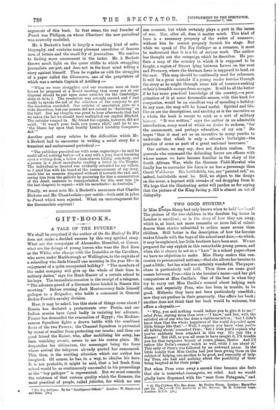GIFT-BOOKS.
A TALE OF THE FUTURE.* WE shall be surprised if the author of On the Heels of De Wet does not make a decided success by this very spirited story. What are the campaigns of Alexander, Hannibal, or Caesar, what are the doings of young heroes who wear the Red Rose or the White, who charge with the Ironsides or the Cavaliers, who serve under Marlborough or Wellington, to the exploits of a schoolboy who finds himself one morning in the year 19— in enjoyment of a quite unexpected holiday P "The members of the cadet company will give up the whole of their time to military duties," says the Head-Master of a certain school to his boys. The immediate occasion is the receipt of a telegram, "The advance-guard of a German force landed in Sussex this morning." Before evening Jack Montmorency finds himself galloper to a Brigadier, who holds a command in General Baden-Powell's cavalry division.
How, it may be asked, has this state of things come about P Russia has declared a protectorate over Persia, and our Indian armies have fared badly in resisting her advance; France has demanded the evacuation of Egypt ; the Mediter- ranean Squadron fights a drawn battle with the combined fleets of the two Powers; the Channel Squadron is prevented by stress of weather from protecting our coasts; and then our good friend the Kaiser, who, after mobilising his army, has been watching events, seems to see his course plain. He despatches his ultimatum, the messenger being the force whose arrival the telegram already quoted has announced. This, then, is the exciting situation which our author has imagined. Of course, he has, in a way, to idealise his hero. It is not probable, it might be said, that a lad fresh from school would be so continuously successful in his proceedings as the "boy galloper" is represented. But we must concede the existence of that curious quality which the Romans, the most practical of people, called fe2icitas, for which no one
• • The Boy Galloper. By the " Intelligence 0111oer." London : W. Blackwood and Sons. [68.J
can account, but which certainly plays a part in the issues of war. Nor, after all, does it matter much. This kind of hero is a necessary property of the writer of romance; without him he cannot properly furnish his stage. But
• while we speak of The Boy Galloper as a romance, it must be understood that it is a bit of serious work. The author has thought out the campaign which he describes. He pre- fixes a map of the country in which it is supposed to be fought, a region of Sussex lying between Lewes on the west and Pevensey, where the German force is supposed to land, on the east. This map should be continually used for reference. It will be a great mistake if a young reader hurries through the story as he might through some tale of treasure-seeking or hair's-breadth escapes from savages. It will be all the better if he has some practical knowledge of the country,—a pere- grination of it at some favourable season, with this book for companion, would be an excellent way of spending a holiday. In any case, the map will be found useful. Spirited and life- like as are the descriptions, and exciting as is the narrative as a whole, the book is meant to rank as a sort of military history. "It was written," says the author in an admirable introduction, every word of which we desire to endorse, "for the amusement, and perhaps education, of my son." He hopes "that it may act as an incentive to many youths to undertake that which is only a citizen's birthright—the practice of arms as part of a great national insurance."
Our author, we may say, does not disdain realism. The generals who command the defending forces are officers with whose names we have become familiar in the story of the South African War, while the German Field-Marshal who finally has to surrender his force is no less a personage than Count Waldersee. His battlefields, too, are "painted red," as, *deed, battlefields must be. Still, we object to the design on the cover, a bayonet with streaks of red dropping from it. We hope that the illustrating artist will pardon us for saying that the picture of the King facing p. 313 is almost an act of disloyalty.






























































 Previous page
Previous page